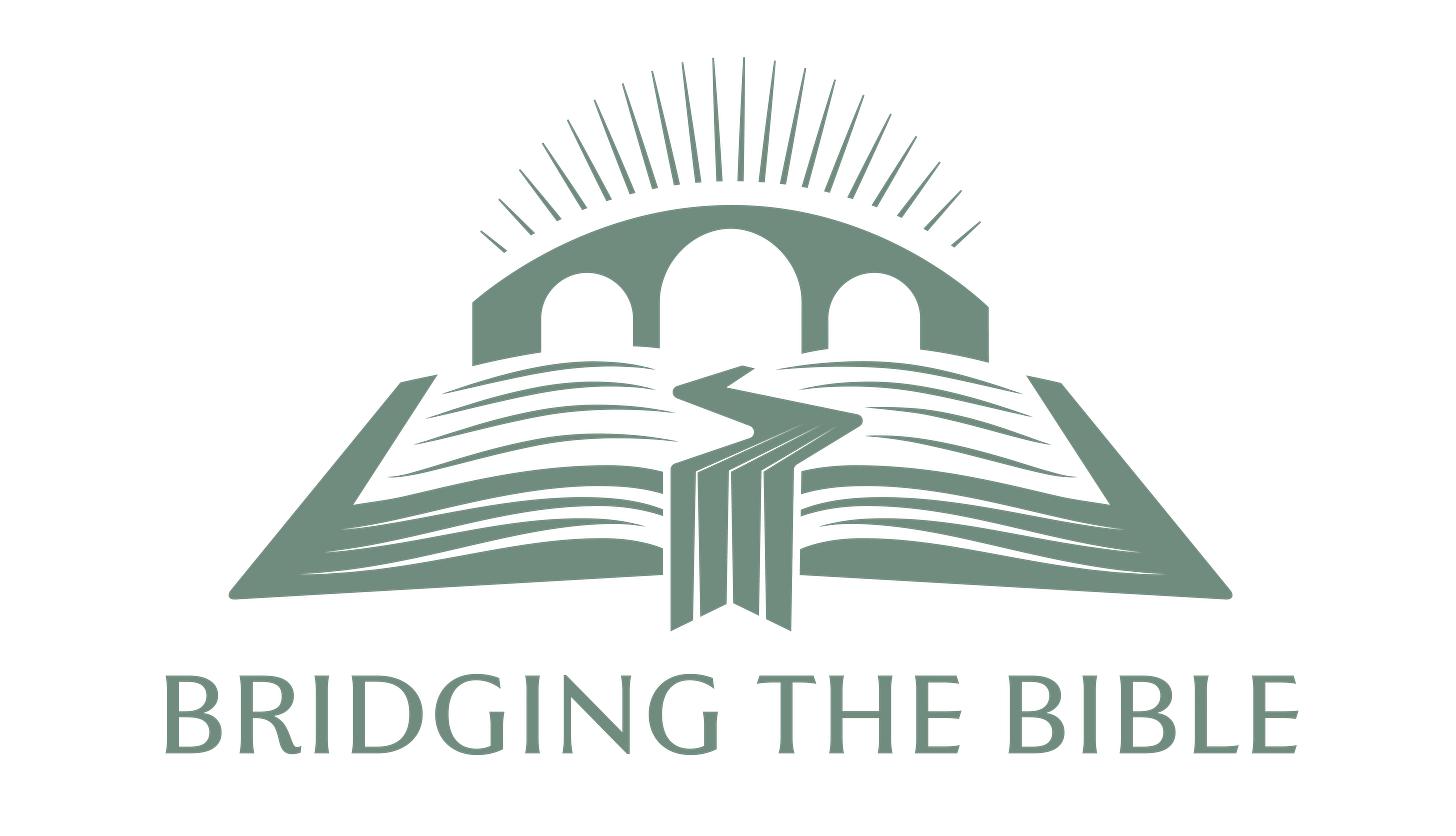The Four Essentials of the Gospel
Grounded in the Gospel part two. Each of the four essential parts of the Gospel explained.
There are four essential aspects to the Gospel—to the good news about what God has done through Jesus to save us. The Gospel is news about: 1) who Jesus is, 2) what Jesus did, and this news is good because 3) we sinners have a broken relationship with God that, 4) can be restored if we trust in Jesus by faith.
Why Four? Why Does it Matter?
I will explain each one in more detail, but first, how do we know that these four parts are inherent to the Gospel? The answer to this first question is simply that we find these four elements in the Bible passages that explicitly outline what the Gospel is or narrate someone sharing the Gospel to others (Acts 2:12-41, Acts 10:36-48, Acts 13:16-41, Acts 17:1-31, Romans 1:1-6, and 1Corinthians 15:1-11). If you sit down and read those Bible passages, you will find these four parts are present in some form or another.
And why does it matter that we clarify what the four essentials are? First, I am aiming for clarity on these four essentials, not so that we make the Gospel complicated, but so that the Gospel is crystallized and simplified.
Second, it matters because salvation is at stake. The Bible is clear there is such a thing as the true Gospel (Galatians 1:6-7), and there are such things as false gospels which are contrary to and distortions of the one true Gospel (Galatians 1:7-9). The true Gospel has the power to save. A false gospel cannot save. Getting the Gospel right is a matter of salvation. What I am suggesting in this article is the true Gospel has these four elements. If at least one is missing/off, then it is not the true Gospel. All four go together; it’s all or none.
Third, it matters because it’s beneficial for us Christians to have clarity for our own sake, and so we are equipped to share the Gospel with others. According to my observations, it is common for a Christian to struggle with answering the question “what is the Gospel?” They might know it in their heart, but speaking it is different. People have beliefs deep down in their heart/mind, but they might not be totally aware of them. Articulating beliefs with words can be challenging for some
#1 Who Jesus is
First, we must believe the truth about who Jesus of Nazareth said He is. Jesus is God, the second member of the Trinity (Father, Son, Holy Spirit). Jesus is the Word who existed from the beginning before creation who then put on human flesh via the incarnation (John 1:1-18). Jesus is the one and only God-Man who was conceived by the Holy Spirit in the womb of a virgin (Matt.1:18-25, Luke 1:26-35). Even though Jesus is God, He is truly human, and He is the only human to have never sinned (Hebrews 4:15, 1John 3:5, 2Corinthians 5:21). Jesus is the Messiah, Savior, Redeemer, and Lord. He is the one the Old Testament points to. If you believe in a Jesus that is human but not God, that is a false Jesus. If you believe in a Jesus that is God, but not fully human, that is a false Jesus. If you get Jesus wrong, you get the Gospel wrong. A Jesus that doesn’t exist can’t save you. The true Jesus can.
#2 What Jesus did
Second, we need to know what Jesus accomplished through the cross. Jesus was crucified on a cross in our place for forgiveness of sins, and He rose from the dead on the third day—all according to God the Father’s sovereign plan. After being raised from the dead, He appeared to His disciples before ascending into heaven to the right hand of the Father. Jesus’ substitutionary death on the cross and His bodily resurrection from the dead are the basis for our faith (1Corinthians 15:17). If Jesus was not raised from the dead, then whatever faith we have is “futile” (1Corinthians 7:16). If Jesus was not crucified in our place, then we are still in our sins. If you believe Jesus did not die on a cross and was not risen from the dead, then that is a false Jesus.
#3 Our Sin
Third, we need to be honest about our sinfulness, our need for God to save us. The news about Jesus is good because we are in a bad situation. The reality of our bad situation is arguably the most difficult to convince people of. Perhaps that is why the Bible tells us that convicting the world of its sin is a supernatural activity the Holy Spirit is involved in doing (John 16:8). The news about Christ sounds strangely unnecessary to those who are told they are good just as they are and told that their heart and feelings are always right. The Gospel is meant to change the sinner, not for the sinner to change the Gospel.
If we say we have no sin, the Bible says we “deceive ourselves” (1John 1:8). John the Baptist said Jesus was “the Lamb of God who takes away the sin of the world,” (John 1:29 emphasis mine). If sin wasn’t a problem, why would the Lamb of God (Jesus) need to take it away? We humans left to our own devices naturally drift away from God: we love ourselves, we love darkness, we love false gods, we succumb to evil, and we ferociously rebel against our creator.
We humans catch a sickness called sin. If you think you’re too wise to catch it, that’s proof you’ve already caught it. We make the same mistake Adam and Eve did; they chose to disobey God’s good command and suffered the consequences of sin, and so do we. Sin is literally killing and enslaving us (Romans 6:23, 7:11). Humanity’s relationship with God has been broken because of sin, but the good news is God wants that relationship restored, and Jesus is the open door to a forgiving Father. God the Father sent His Son so that people could be saved through Jesus (John 3:17). Thankfully, Christ Jesus came into the world to save sinners (1Timothy 1:15).
#4 Salvation by Grace through Faith in Jesus
Fourth, the “so what?” part of the Gospel is the necessity to repent of our sin and believe/trust in Jesus. What must one do to be saved? Believe in the Lord Jesus (Acts 16:31). If we confess with our mouth that Jesus is Lord and if we believe in our heart that God raised Him from the dead, we will be saved (Romans 10:9-10). Whoever believes in Christ by faith receives eternal life (John 3:16, 1John 5:13). Faith admits that I need God to forgive me for sinning against Him, then puts personal trust in the person of Jesus as Savior/Mediator, so that I can receive forgiveness from God and start enjoying relationship with Him.
When I became a Christian, I realized God wasn’t happy with how I had been rejecting Him in favor of myself and other false gods, but I also knew His arms were wide open inviting me to be forgiven if I trusted Him. This trust is a reliance and dependence on the Person of Christ—on who Jesus is and what He has done—not on anything we do ourselves. Receiving what Jesus did for us is a free gift from God, unable to be earned, only to be received. Grace can only be received. Faith is how you receive. Jesus is God the Father’s gift to us. We receive Jesus when we trust Him by faith.
If you do not trust Jesus by faith, God says you are “condemned already” (John 3:18) because your unrepentant, hard heart is “storing up wrath for yourself on the day of wrath when God’s righteous judgment will be revealed,” (Romans 2:5). This wrath of God’s final judgment is a wrath that is “against all ungodliness and unrighteousness of men, who by their unrighteousness suppress the truth,” (Romans 1:18). God’s holy and just wrath is currently being “stored up” for a future time pending Christ’s second coming (2Peter 3:7). In the meantime, God is “patient toward you…not wishing that any should perish, but that all should reach repentance,” (2Peter 3:9). The invitation to receive God’s grace by trusting Jesus is currently open, but it could close at any time with the return of Christ, so accept before it’s too late!
Something supernatural happens when we trust in Christ. God literally re-births us through His Holy Spirit (John 1:11-13, 3:1-8), and we become a new creation according to the image of Christ (2Corinthians 5:17, Colossians 3:10). God frees us from the chains of the power of sin (Romans 6:7). God adopts us into His family as His child and fills us with His very own Spirit so that we know we are His (Romans 8:9,15, Galatians 4:6), and so that we can live like we are His (John 15:1-17, Romans 12:1-2). He transforms our heart so that we joyfully surrender to the ongoing lordship of Jesus. We get to enjoy restored relationship with God in which we get to know Him more and experience His presence in daily life. We get a taste of what life with God in eternity will be like when see Him face to face in the age to come.
This fourth part of the Gospel has the first three parts baked into it. Trusting Jesus by faith is the fourth part, but it’s built on the first three. Trust by faith (#4) in the God-Man Jesus who is the second Person of the Trinity (#1), who was crucified in our place and who rose from the dead (#2), so that our relationship with God—which was broken due to our sin (#3)—can be restored for eternity.
These are the four essentials of the Gospel.
In part three of Grounded in the Gospel, we will look at the heart of the Gospel. At the heart of the Good News is God’s love and His transformative grace. We will go into more depth about how the grace of God changes our identity and the way we live.
About the Author
Colin Rieke is a regular guy whose life was really messed up before finding wholeness in God’s grace through Jesus Christ. Colin is a writer/podcaster, loves having conversations with people about truth, and aspires to be a vocational pastor-theologian. Colin reads theology, church history, and biblical counseling books in his spare time for fun, and he is passionate about offering biblical solutions to people’s real life challenges so that they live healthy lives transformed by God’s grace. Colin became a Christian as an adult around the time he graduated from college with a BA in Philosophy, then he met his wife Rachelle at church, and they got married in 2016. Colin graduated from Phoenix Seminary with an MA in Christian Ministry in 2025.







